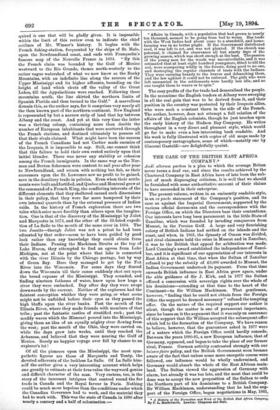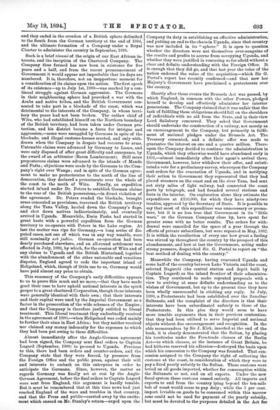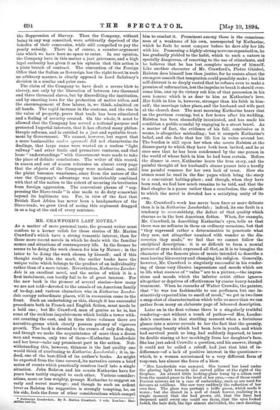THE CASE OF THE BRITISH EAST AFRICA C 0 MPAN
Y.* Audi alteram, partem is a plea to which the average Briton never turns a deaf ear, and since the results achieved by the Chartered Company in East Africa have of late been the sub- ject of much disparaging criticism, it is well that we should be furnished with some authoritative account of their claims to have succeeded in their enterprise.
The present volume, written in an eminently readable style, is an ex parte statement of the Company's position, and its case as against the Imperial Government, supported by the various official documents and the correspondence with the Foreign Office, on which the Directors base their contentions. Our interests have long been paramount in the little State of Zanzibar, which was founded by invading conquerors from Muscat, in the Persian Gulf. A large and very flourishing colony of British Indians had settled on the islands and the coast, and when, in 1861, the dynasty of Omani WWI divided, and rival claimants held the reins in Muscat and in Zanzibar, it was to the British that appeal for arbitration was made. Lord Canning's award established the independence of Zanzi- bar, and it is significant of our appreciation of our interests in East Africa at that time, that when the Sultan of Zanzibar refused to pay the subsidy of £8,000 awarded to Muscat, the Indian Government undertook its payment. From that time onwards British influence in East Africa grew apace, under the able guidance of Sir J. Kirk, and in 1877 the Sultan offered a concession with sovereign rights over the whole of his dominions—extending at that time to the heart of the Continent—to Sir William Mackinnon. That gentleman, however, "finding that he could not obtain from the Foreign Office the support he deemed necessary" refused the tempting offer. On the nature of the required support our author is silent, though the matter is one of paramount importance, since he bases on it the argument that it was only on assurance of this support that Sir William accepted the subsequent offer which led to the formation of the Company. We have reason to believe, however, that the guarantees asked in 1877 were of a nature which the Foreign Office could hardly concede. Between the years 1880-85, a new European influence, that of Germany, appeared, and began to take the place of our former rival, France. German activity contrasted strongly with our laisseziaire policy, and the British Government soon became aware of the fact that unless some more energetic course were followed, our influence would be wholly undermined, and Germany would absorb the whole of the East African main- land. The Sultan viewed the aggression of Germany with alarm, but already it was too late, and the most that could be done was to accept the new proposition of the Sultan to cede the Northern part of his dominions to a British Company. Sir William Mackinnon, understanding that he had the sup- port of the Foreign Office, began negotiations in May, 1885, • 4History of the Formation and Work of the British Bast Africa Company. By E L. Xaodermott. Loudon: Chapman and Hall.
and they ended in the creation of a British sphere delimited to the South from the German territory at the end of 1886, and the ultimate formation of a Company under a Royal Charter to administer the country in September, 1888.
Such is a brief resume of the origin of our East African in- terests, and the inception of the Chartered Company. The Company thus formed has now been in existence for five years and a half, and from the recent pronouncement of Government it would appear not improbable that its days are numbered. It is, therefore, not an inopportune moment for a consideration of its claims upon the nation. The first epoch of its existence—up to July 1st, 1890—was marked by a con- tinual struggle against German aggression. The Germans in their neighbouring sphere had provoked a war with the Arabs and native tribes, and the British Government con- sented to take part in a blockade of the coast, which was -detrimental to the interests of the Company, in whose terri- tory the peace had not been broken. The outlaw chief of Witu, who had established himself on the Northern boundary -of the British territory, had been taken under German pro- tection, and his district became a focus for intrigue and aggression,—arms were smuggled by Germans in spite of the blockade, and illegal customs-houses erected, and only with- drawn when the Company in despair had recourse to arms. Untenable claims were advanced by Germany to Lamu, and were only disposed of after great difficulty and annoyance, by the award of an arbitrator (Baron Lambermont). Still more preposterous claims were advanced to the islands of Mande and Patta ; objections were made by the Germans to the Com- pany's right over Wangs, ; and in spite of the German agree- ment to make no protectorates to the north of the line of demarcation, they declared a protectorate over the whole of the coast to the north of Witu. Finally, an expedition started inland under Dr. Peters to establish German claims to the rear of the British possessions,—in direct violation of the agreement. Dr. Peters evaded the blockade, brought arms concealed as provisions, traversed the British territory along the Tana Valley, hauled down the Company's flags, and shot down natives indiscriminately, and eventually arrived in Uganda. Meanwhile, Emin Pasha had started in great haste with a powerful expedition from the German territory to co-operate with Peters in the Lake region. At last the matter was ripe for Germany,—a long series of dis- puted cases, not one of which was in any way tenable, were still nominally sub judice. German co-operation had been dearly purchased elsewhere, and an all-round settlement was 'effected in July, 1890, by which, for the cession of Witu and of any claims to Uganda and the British Hinterland, together with the abandonment of the other untenable and vexatious disputes, England agreed to cede the important island of Heligoland, which, though of little use to us, Germany would have paid almost any price to obtain.
This summary of the Company's early difficulties appears to us to prove this much and no more,—that they have made good their case to have upheld national interests in the spirit proper to a great chartered Corporation, though these interests were generally identical with their own ; that their interests and their capital were used by the Imperial Government as a factor in the prosecution of the wide schemes of the Empire ; and that the Company is therefore justly entitled to liberal treatment. This liberal treatment they undoubtedly received in the agreement of 1890,—when Heligoland was ceded mainly to further their aims in East Africa; but they neither received nor claimed any money indemnity for the expenses to which they had been put owing to these difficulties.
Almost immediately after the Anglo-German agreement had been signed, the Company sent final orders to Captain Lugard (September, 1890) to proceed to Uganda. Previous to this, there had been orders and counter-orders, and the Company state that they were forced, by pressure from the Foreign Office and the public press, against their will and interests to embark on this enterprise in order to anticipate the Germans. Since, however, the matter as regards Germany was finally set at rest by the Anglo- German Agreement, before the final orders to Captain Lugard were sent from England, this argument is hardly tenable. But it must be remembered that at this time news had just reached England of the wars and troubles in that country, -and that the Press and public—carried away by the excite- ment which ensued on Mr. Stanley's return—urged upon the
Company its duty in establishing an effective administration, and putting an end to the chaos in Uganda, since that country was now included in its "sphere." It is open to question whether the directors were not themselves over-sanguine of the results and profits to accrue from occupying Uganda, and whether they were justified in venturing so far afield without a clear and definite understanding with the Foreign Office. It is enough that they did go, and that last year the voice of the nation endorsed the value of the acquisition—which Sir G. Portal's report has recently confirmed—and that now her Majesty's Government have prozlaimed a protectorate over the country.
Shortly after these events the Brussels Act was passed, by which England, in common with the other Powers, pledged herself to develop and effectively administer her interior possessions. The Company claimed that it was unfair that the task of fulfilling these obligations should fall on the shoulders of individuals with no aid from the State, and in their view Lord Salisbury concurred. They asked that Government should undertake the construction of a railway, not merely as an encouragement to the Company, but primarily in fulfil- ment of national pledges under the Brussels Act. The Treasury consented, and a definite offer was made to guarantee the interest on one and a quarter million. There- upon the Company decided to continue the administration in Uganda, which they otherwise would have abandoned early in 1891,—almost immediately after their agent's arrival there. Government, however, later withdrew their offer, and substi- tuted a vote for a preliminary survey, whereupon the Company sent orders for the evacuation of Uganda, and in notifying their action to Government they represented that they had placed steamers on the coast and on the river Tana, had sent out sixty miles of light railway, had connected the coast ports by telegraph, and had founded several stations and forts in the interior. On exploration alone they estimate the expenditure at 2150,000, for which they have ninety-two treaties, approved by the Secretary of State. It is possible to say that most of this expenditure was unnecessary or prema- ture, but it is no less true that Government in its "little wars," or the German Company close by, have spent far greater sums with no better results. The orders for with- drawal were cancelled for the space of a year through the efforts of private subscribers, but were repeated in May, 1892. It is within the recollection of every one how great a feeling was stirred up throughout the country by the prospect of this abandonment, and how at last the Government, acting under strong pressure, despatched Sir. G. Portal to report on "the best method of dealing with the country."
Meanwhile the Company, having evacuated Uganda and some half of the country between Lake Victoria and the coast, selected Dagoreti (the central station and depot built by Captain Lugard) as the inland frontier of their administra- tion. They continued to make repeated proposals with a view to arriving at some definite understanding as to the wishes of Government, but up to the present time they have been wholly unsuccessful in eliciting any reply. In July, 1890, a Protectorate had been established over the Zanzibar Sultanate, and the complaint of the directors is that their interests have been subordinated unfairly to those of the Protectorate. In this plea they would seem to have more tenable arguments than in their previous contention, that they had been utilised to serve Imperial and national objects without due encouragement and recognition. In the able memorandum by Sir J. Kirk, inserted at the end of the book, it is clearly demonstrated that the Sultan, by placing his territories under the Free-trade clauses of the Berlin Act—to which clauses, at the instance of Great Britain, he had hitherto reserved his adhesion—destroyed the basis upon which his concession to the Company was founded. That con- cession assigned to the Company the right of collecting the customs at the coast, in consideration of which they were to pay a fixed yearly subsidy to the Sultan. These customs were levied on all goods imported, whether for consumption within the Sultanate or not, and on all exports. Under the new fiscal system these customs ceased entirely. All imports and exports to and from the country lying beyond the ten-mile belt of coast would cease to pay duty; while the 5 per cent. import leviable on goods to be consumed within this narrow zone could not be used for payment of the yearly subsidy, but must be devoted to the purposes detailed in the Act for
the Suppression of Slavery. Thus the Company, without being in any way consulted, were arbitrarily deprived of the benefits of their concession, while still compelled to pay the yearly subsidy. There is, of course, a counter-argument into which we have here no space to enter. In our opinion, the Company have in this matter a just grievance, and a high legal authority has given it as his opinion that this action is a plain breach of contract. The contention of the Foreign Office that the Sultan as Sovereign has the right to act in such an arbitrary manner, is clearly opposed to Lord Salisbury's decision in a similar and prior case.
The claim of the Company to have dealt a severe bloiv to slavery, not only by the liberation of between two thousand and three thousand slaves, but by discrediting the institution, and by enacting laws for the protection of native tribes, and the encouragement of free labour, is, we think, admitted on all hands. The rapid increase in the customs, and the rise in the value of property, prove that trade has been stimulated and a feeling of security created. On the whole, it must be allowed that the Company has served a national purpose and protected Imperial interests, that it has effected many philan- thropic reforms, and is entitled to a just and equitable treat- ment by Government. We cannot, however, but regret that a more businesslike mans operandi did not characterise its dealings, that large sums were wasted on a useless "light railway" and other futile and premature ventures, and that loose " understandings " with Government were made to take the place of definite conclusions. The writer of this record, in season and out of season reiterates on almost every page that the objects of the Company were national ones, until the plaint becomes wearisome, since from the nature of the case the Company's advantage was inextricably combined with that of the nation to the extent of securing its territories from foreign aggression. The convenient phrase of "sup- pressing the Slave-trade" is also made to do duty somewhat beyond its legitimate use. For, in view of the fact that British East Africa has never been a headquarters of the Slave-trade, we grow tired of seeing this argument dragged in as a tag at the end of every sentence.








































 Previous page
Previous page